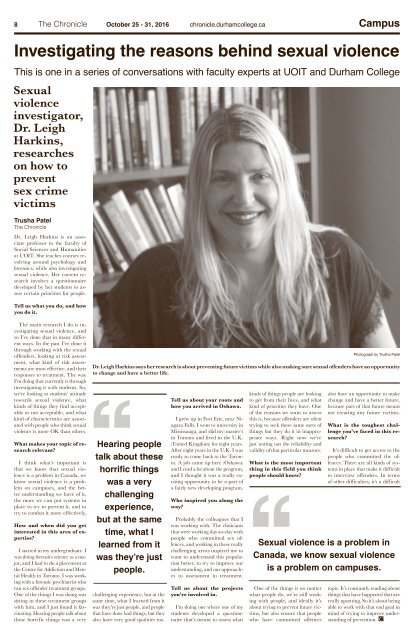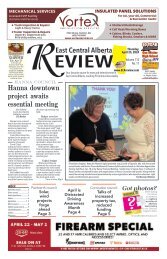Create successful ePaper yourself
Turn your PDF publications into a flip-book with our unique Google optimized e-Paper software.
8 The Chronicle October 25 - 31, 20<strong>16</strong> chronicle.durhamcollege.ca Campus<br />
Investigating the reasons behind sexual violence<br />
This is one in a series of conversations with faculty experts at UOIT and Durham College<br />
Sexual<br />
violence<br />
investigator,<br />
Dr. Leigh<br />
Harkins,<br />
researches<br />
on how to<br />
prevent<br />
sex crime<br />
victims<br />
Trusha Patel<br />
The Chronicle<br />
Dr. Leigh Harkins is an associate<br />
professor in the faculty of<br />
Social Sciences and Humanities<br />
at UOIT. She teaches courses revolving<br />
around psychology and<br />
forensics, while also investigating<br />
sexual violence. Her current research<br />
involves a questionnaire<br />
developed by her students to assess<br />
certain priorities for people.<br />
Tell us what you do, and how<br />
you do it.<br />
The main research I do is investigating<br />
sexual violence, and<br />
so I’ve done that in many different<br />
ways. In the past I’ve done it<br />
through working with the sexual<br />
offenders, looking at risk assessment,<br />
what kind of risk assessments<br />
are most effective, and their<br />
responses to treatment. The way<br />
I’m doing that currently is through<br />
investigating it with students. So,<br />
we’re looking at students’ attitude<br />
towards sexual violence, what<br />
kinds of things they find acceptable<br />
or not acceptable, and what<br />
kind of characteristics are associated<br />
with people who think sexual<br />
violence is more OK than others.<br />
What makes your topic of research<br />
relevant?<br />
I think what’s important is<br />
that we know that sexual violence<br />
is a problem in Canada, we<br />
know sexual violence is a problem<br />
on campuses, and the better<br />
understanding we have of it,<br />
the more we can put systems in<br />
place to try to prevent it, and to<br />
try to combat it more effectively.<br />
How and when did you get<br />
interested in this area of expertise?<br />
I started in my undergraduate. I<br />
was doing forensics science as a major,<br />
and I had to do a placement at<br />
the Centre for Addiction and Mental<br />
Health in Toronto. I was working<br />
with a forensic psychiatrist who<br />
ran sex offender treatment groups.<br />
One of the things I was doing was<br />
sitting in these treatment groups<br />
with him, and I just found it fascinating.<br />
Hearing people talk about<br />
these horrific things was a very<br />
challenging experience, but at the<br />
same time, what I learned from it<br />
was they’re just people, and people<br />
that have done bad things, but they<br />
also have very good qualities too.<br />
Tell us about your roots and<br />
how you arrived in Oshawa.<br />
I grew up in Fort Erie, near Niagara<br />
Falls. I went to university in<br />
Mississauga, and (did my) master’s<br />
in Toronto and lived in the U.K.<br />
(United Kingdom) for eight years.<br />
After eight years in the U.K. I was<br />
ready to come back to the Toronto.<br />
A job came up here (Oshawa)<br />
and I read a lot about the program,<br />
and I thought it was a really exciting<br />
opportunity to be a part of<br />
a fairly new developing program.<br />
Who inspired you along the<br />
way?<br />
Probably the colleagues that I<br />
was working with. The clinicians<br />
that were working day-to-day with<br />
people who committed sex offences,<br />
and working in these really<br />
challenging areas inspired me to<br />
want to understand this population<br />
better, to try to improve our<br />
understanding, and our approaches<br />
to assessment to treatment.<br />
Tell us about the projects<br />
you’re involved in.<br />
I’m doing one where one of my<br />
students developed a questionnaire<br />
that’s meant to assess what<br />
kinds of things people are looking<br />
to get from their lives, and what<br />
kind of priorities they have. One<br />
of the reasons we want to assess<br />
this is, because offenders are often<br />
trying to seek these same sorts of<br />
things but they do it in inappropriate<br />
ways. Right now we’re<br />
just testing out the reliability and<br />
validity of that particular measure.<br />
What is the most important<br />
thing in this field you think<br />
people should know?<br />
One of the things is no matter<br />
what people do, we’re still working<br />
with people, and ideally it’s<br />
about trying to prevent future victims,<br />
but also ensure that people<br />
who have committed offences<br />
Photograph by Trusha Patel<br />
Dr. Leigh Harkins says her research is about preventing future victims while also making sure sexual offenders have an opportunity<br />
to change and have a better life.<br />
Hearing people<br />
talk about these<br />
horrific things<br />
was a very<br />
challenging<br />
experience,<br />
but at the same<br />
time, what I<br />
learned from it<br />
was they’re just<br />
people.<br />
also have an opportunity to make<br />
change and have a better future,<br />
because part of that future means<br />
not creating any future victims.<br />
What is the toughest challenge<br />
you’ve faced in this research?<br />
It’s difficult to get access to the<br />
people who committed the offences.<br />
There are all kinds of systems<br />
in place that make it difficult<br />
to interview offenders. In terms<br />
of other difficulties, it’s a difficult<br />
Sexual violence is a problem in<br />
Canada, we know sexual violence<br />
is a problem on campuses.<br />
topic. It’s constantly reading about<br />
things that have happened that are<br />
really upsetting. So it’s about being<br />
able to work with that end goal in<br />
mind of trying to improve understanding<br />
of prevention.


















